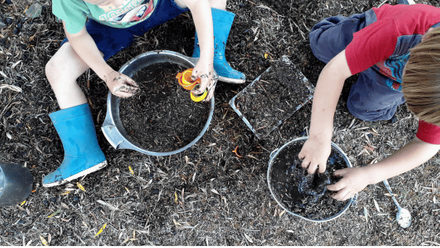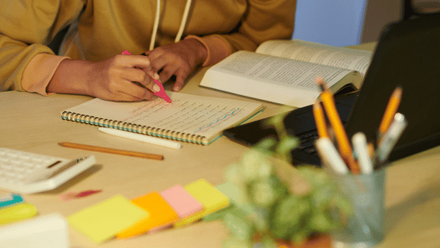How to build reflective practice into your every day
Reflective practice is a powerful way to enhance personal and professional growth, allowing us to think deeply about our own actions and skills to improve upon our understanding of professional conduct, and make informed decisions about our practice moving forward. It also helps us identify our strengths, meaning we can contribute effectively to the wider team environment, supporting others and creating a collaborative culture for wider organisational growth.
As professionals in early education and care, we’re busy! Time is precious and this can often make it difficult to find the time to dedicate to truly thoughtful reflective opportunities. Nonetheless, it’s a very influential part of developing our personal and professional sense of self, and it has massive benefits for our continuing development.
In this learning workout, we’re going to share some ways to implement reflective practice into the everyday, making it a seamless part of daily routine and a valued aspect of practice.
What is reflective practice?
Reflective practice involves continuously reflecting on our own actions, behaviours and responses in order to critically evaluate our performance, identifying what went well and examining how to further these skills, as well as recognising areas of improvement and thoughtfully enquiring into how these results can be best achieved.
Reflective practice can be done in a variety of creative ways, making it the perfect method to harness skills and improve our working practice in a way that can be adapted by all in their own special ways.
We can reflect on our own performance from an individual standpoint, which has advantages for tracking thought processes and negotiating emotions, such as lacking confidence or fear of failure. This personal reflection can create an opportunity to examine not only the performance of an action in practice but also to sensitively consider the emotional impact our professionality can have on our personal identity too.
Alternatively, reflective practice can be undertaken within a group, involving peer observations that allow you to gain an alternative perspective on your performance. This can be especially advantageous to identify areas of strength that we may struggle to identify in ourselves, or equally to learn more about an aspect of practice that others have a particular knowledge or experience in.
Implementing reflective practice into your daily routine
Contrary to popular belief, reflective practice needn’t be arduous and lengthy. Whilst critical thinking and sensitive probing are core aspects of in-depth, impact thinking, reflecting on our activities is not about analysing every single move we make, rather focusing on a small interaction and taking the time to ponder on our entire practice, including internal emotions and attitudes.
Create a reflection ritual
Make a dedicated effort to set aside a regular time that encourages reflection, such as a weekly review or a monthly check-in. This could be with others in your team, a manager or simply discussing with a friend. Individual reflections are also important to make time for but establishing and holding yourself to a routine can be challenging without someone else’s influence.
The benefits of this include a consistency to your reflective practice that allows you to engrain it into your regular routine. The more you do it, the more natural a thought-process it will become and the less likely you will need to make a concerted effort to set aside time to think critically about your practice… you’ll just do it!
Use reflection prompts
The most difficult part with any reflective task is knowing how to get started. It’s the part of the activity that takes the most time! Prepare prompts or questions that encourage reflection into your routine and allow you to pick up on your reflections whenever time crops up. It delays getting started and helps you to be more productive in your reflective time, engrossing yourself into one question with greater attention to detail.
This also avoids the feelings of overwhelm that can come when first starting out in your reflective journey. It helps to keep your insights focused and makes it easier to gain value from daily experiences.
Make it work for you
This is all about you! So, make it work best for the ways in which you learn. Many reflective moments can be grasped in the working day through small acknowledgements that can be returned to and examined in greater depth later on. Utilise the technology around you to capture these moments, using observations of children to influence your own reflections on learning environments, for example.
Reflective practice is a working journey so treat it as one! Why not establish a working whiteboard, or use sticky notes on the wall, in the room that the team can use to jot down moments and ideas, bringing them together in a collective conversation when the time is right? These magical moments are key to our growing practice, but can be tricky to contain sometimes when other priorities take over.
Mindful moments for action reviews
Reflective practice doesn’t always need to be evidenced, written on a neat form or created into a beautifully intricate scrapbook page. Some of the best reflections come in the quieter moments of the day as thoughts of our own. After completing a significant task or activity, take a few minutes to just think about the main considerations of your performance. Consider what went well and what you might do differently next time to formatively assess your own successes and mistakes.
This not only give you a quick and accessible way to reflect but also allows you to independently manage your time and enhances your problem-solving abilities too. It might even be something that can be immediately actioned and evaluated again!
Reflections on reflective practice
It’s a common belief that reflective practice is a time-consuming process, involving heaps of paperwork and only acknowledged by leaders and managers during formal supervisions or interviews. These are myths that can be busted by considering the value of reflection upon the individual, their sense of professional identity and personability too.
Building a reflective attitude that can be easily drawn into every day allows professionals to become resilient to mistakes, critically evaluating their own performance to constantly improve and to deliver constructive feedback sensitively to support others with their career development.
Have a look at our other career pathways resources to explore more about reflective practice and growth mindsets or take a look at the activity below.
Prompts for reflective practice
Reflective practice can be difficult to carry out if you’re unsure of the questions to ask! Think about the prompts below to get you started on your reflective journey.
A few tips:
- Identify an area of practice you are not very comfortable with, but also have some knowledge of – these are always the hardest to review and a great way to get you started.
- Within this area, identify one activity or interaction that took place recently. This makes it easier to remember finer details and it is the smaller detail we’d like to try to reflect on in order to make small changes for great impact.
- You don’t need to write things down, but it might help to organise your thoughts. You can do this by writing down key words, recording a voice note or making a mind map.
Prompts:
- How did you feel before and during the interaction? Was there an aspect of this that influenced how you proceeded?
- Is there anything about the interaction that surprised you? What happened and how did you navigate it?
- What did the interaction result in and how do you feel about the outcome? Was it expected?
- Can you identify any strengths you brought to your practice? How might these skills be extended to support others and further your own practice?
- Are there any immediate areas identified for improvement? How might you go about taking next steps in meeting these areas and exploring further ways to develop on these identified skills?






